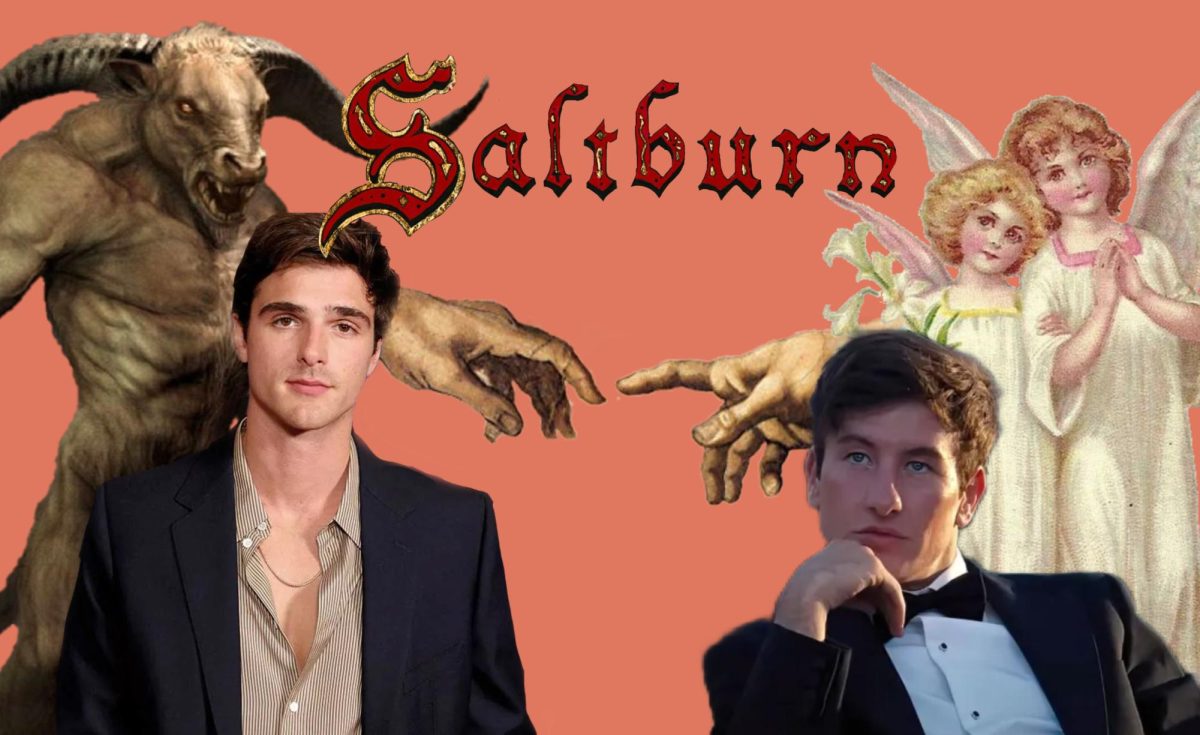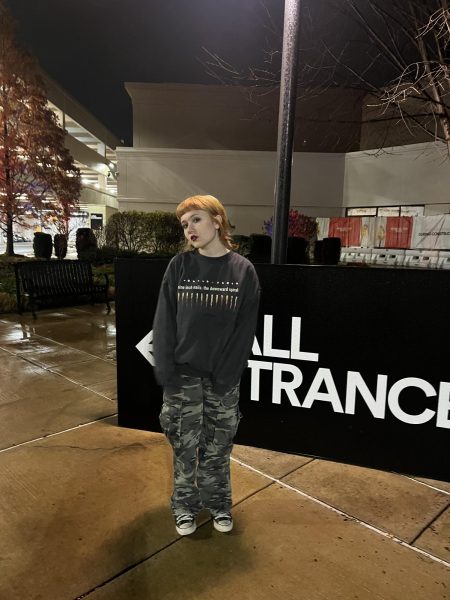This article contains spoilers for the 2023 “Saltburn” Movie
“Saltburn” came out about five months ago and it seems people still don’t understand it. Most audiences focus on its funnier and disturbing scenes as well as the famous actors but don’t value the film for its deeper themes. This is understandable–the movie is very funny, and certain scenes will stick with you–but fans should also consider that “Saltburn” is a modern classic.
Starring Barry Keoghan and Jacob Elordi, “Saltburn” is a dark-comedy/thriller about Oliver Quick (Barry Keoghan), a poor college student who is invited to live with his rich friend, Felix Catton (Jacob Elordi), and his family over the summer at their estate, Saltburn. Things begin to go wrong as Oliver continues his stay at Saltburn. Oliver is revealed to be an average guy who just has rich tastes. The audience discovers that Oliver is the one making everything go bad just because he wants Saltburn. At the movie’s end, Oliver inherits Saltburn from Rosamund Pike’s character, Elspeth Catton.
Before discussing the meaning of “Saltburn,” we actually should look at the ancient Greek myth that inspired this story: The Myth of Theseus and the Minotaur. Son of Queen Pasiphae and a Bull, the Minotaur is a creature from Greek Mythology that is half bull, half human. King Minos, Queen Pasiphae’s husband, was so embarrassed that his half-son was part-bull, he had a labyrinth constructed to hold the Minotaur. King Minos wanted 7 men every 9 years to go to the Minotaur and slay him. Thesus was one of the people who announced that he would kill the Minotaur, but Minos knew that even if he slayed the Minotaur, Theseus would never leave the Labyrinth because the Labyrinth was so puzzling and complicated.
Before Theseus ventures to his doom, he meets Princess Aridane, who falls in love with Theseus and decides that she will help him by giving him a thread that he can unwind so Theseus doesn’t forget where he entered the labyrinth. After Princess Aridane gave him the thread, Theseus entered the Labyrinth, killed the Minotaur, and escaped the Labyrinth with the help of the thread. He becomes the hero of Crete and eventually takes the throne because he is seen as such a hero.
Drawing from the original myth, the film signals to us how they reference the myth of Theseus and the Minotaur. The maze, the costumes at Oliver’s party, the Minotaur statue in the middle of the maze: there are so many references to the story of Theseus and the Minotaur. At Oliver’s birthday party, Oliver is dressed up as a minotaur and Felix is dressed up as an angel. This symbolizes Oliver as an anti-hero, aka the Minotaur, and Felix as a savior aka Theseus.
The story we know, however, is flipped. It is shown in the morning when Felix is discovered dead in the maze. Felix was the Minotaur this whole time, never leaving the ‘Labyrinth’ while Oliver killed Felix and was able to leave the maze. Elspeth treats Oliver like a son (or a hero) and allows him to eventually take over Saltburn. Oliver is Theseus, even if he seems like the Minotaur. He left the Labyrinth and took the ‘throne’ of the Saltburn estate.
Flipping the roles of the Minotaur and Theseus is on purpose. The Minotaur has no control over his situation, like how Felix has no control over his rich family and life. Theseus has that control, like Oliver. But, Oliver wanted more than just control. He wanted Felix’s money, family, and life. Even if that meant having no control, like the Minotaur. “Saltburn” isn’t a commentary on eating the rich, but rather a commentary on becoming the rich, even if that means destroying your current life and the lives of others.
Felix’s sister, Venetia Catton (Alison Oliver), says something to Oliver before her death that sums up the whole movie’s meaning in two sentences:
“I don’t think you’re a spider, you’re a moth. Quiet, harmless, drawn to shiny things, banging up against a window, and begging to get in.”
Oliver lies about his whole life to be able to stay with Felix and his family. He says his parents are drug addicts and that he is this traumatized kid who doesn’t want to go home for the summer, but really, he lives a perfectly normal middle-class life and he orchestrated the whole thing. He just wants to indulge in their rich life. He’s attracted to shiny, expensive things like Felix and the Saltburn estate. Oliver doesn’t want to eat the rich and destroy them, he wants to destroy the rich and become them.
“Saltburn” is shocking and dramatic with its unhinged scenes, like the iconic bathtub scene and the ending scene, in which a naked Oliver dances through the house he now owns. Audiences of the film were attracted to the macabre and the strange. But the film isn’t just weird and crazy. Because it is supposed to be a dark comedy, some scenes are humorous and funny, but there are some sadder scenes, such as the karaoke scene, which do signal that there is more depth.
Audiences want something easy to understand, which “Saltburn” is on the surface, but for a two-hour movie where most of the meaning is revealed in the last 20 to 30 minutes, it is understandable why people would talk more about the shocking and entertaining scenes in the beginning and middle. These shocking scenes may draw viewers in, but they also give the characters time to marinate and develop. In this time, we see how much of a mastermind Oliver is and how messed up Felix’s family is.
“Saltburn” is a film full of laughs, screams, and corruption, but that corruption is important. The corruption of Saltburn shows how the rich think they are selfless but are actually selfish. It shows how many average people don’t want to eat the rich, but rather become the rich. “Saltburn” shows how the minds of apathetic people operate, that being either Oliver or the Catton family. The whole meaning of “Saltburn” is how apathetic everybody is, no matter what class, and, because of this apathy, people of wealth and stature are prone to miss that the hero is also the Minotaur.















maci jordan • Apr 5, 2024 at 9:22 am
This was a great explanation of the movie. When I watched it I was confused but this helped me to understand it better.